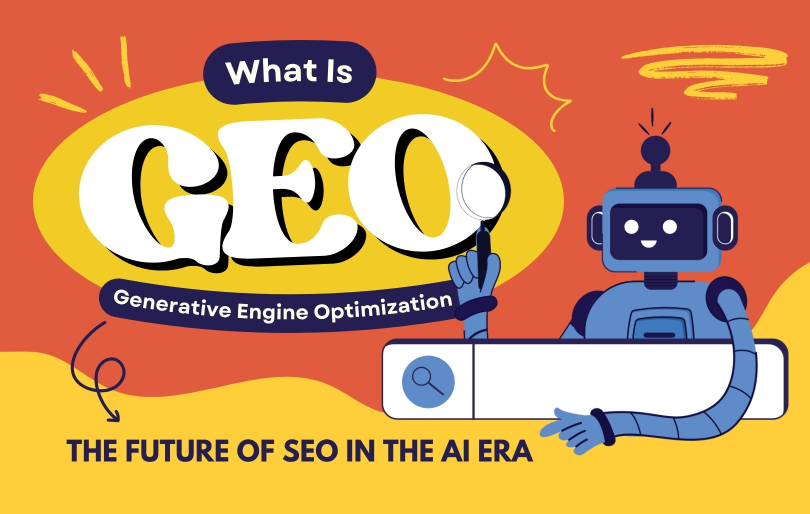What Is Generative Engine Optimization (GEO)? The Future of SEO in the AI Era
As we step into an era dominated by artificial intelligence, the landscape of search engine optimization is undergoing a radical transformation. Enter Generative Engine Optimization (GEO), a pioneering approach that harnesses the power of AI to elevate digital marketing strategies. Unlike traditional SEO, which focuses predominantly on static keywords and backlinks, GEO innovatively integrates predictive algorithms and machine learning to optimize content dynamically. This revolutionary shift promises to not just enhance site visibility but also to personalize user experiences like never before.
In this article, we’ll delve into what Generative Engine Optimization entails, its key components, and why embracing this futuristic strategy is essential for businesses looking to thrive in a hyper-competitive digital realm. Get ready to explore how GEO is set to redefine the future of SEO and put your brand at the forefront of the AI revolution.
Understanding Generative Engine Optimization (GEO)
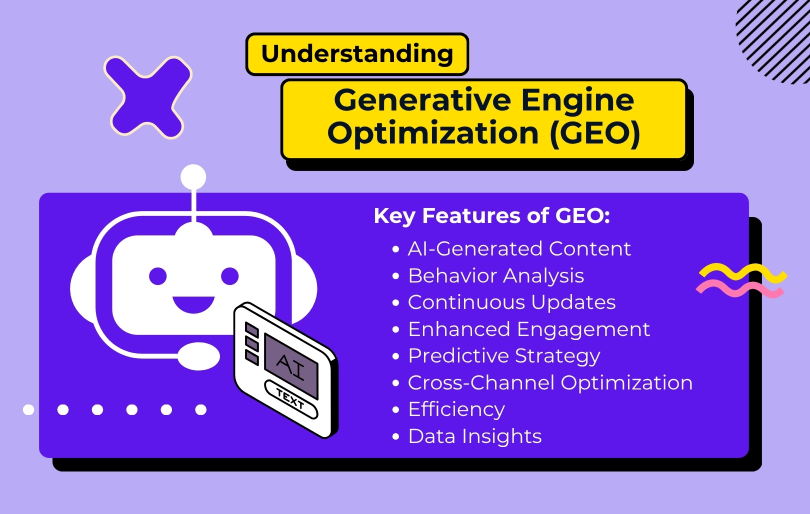
Generative Engine Optimization (GEO) is transforming digital marketing by using AI to predict user intent, generate personalized content, and optimize continuously. Unlike traditional SEO, GEO ensures websites remain dynamic, relevant, and highly engaging, enhancing visibility and user satisfaction.
Key Features of GEO:
- AI-Generated Content: Tailored for user intent.
- Behavior Analysis: Uses search and interaction data.
- Continuous Updates: Keeps content relevant.
- Enhanced Engagement: Personalized experiences for users.
- Predictive Strategy: Anticipates trends and needs.
- Cross-Channel Optimization: Works on web and social.
- Efficiency: Reduces manual work for marketers.
- Data Insights: Improves content decisions.
Discover how AI-powered digital marketing strategies enhance GEO performance and user engagement.
This bulleted approach demonstrates how GEO empowers marketers to combine AI intelligence with SEO best practices, creating smarter, faster, and more effective digital campaigns. This strategy not only enhances content optimization but also improves user experience and engagement on websites.
The Evolution of SEO in the Age of AI
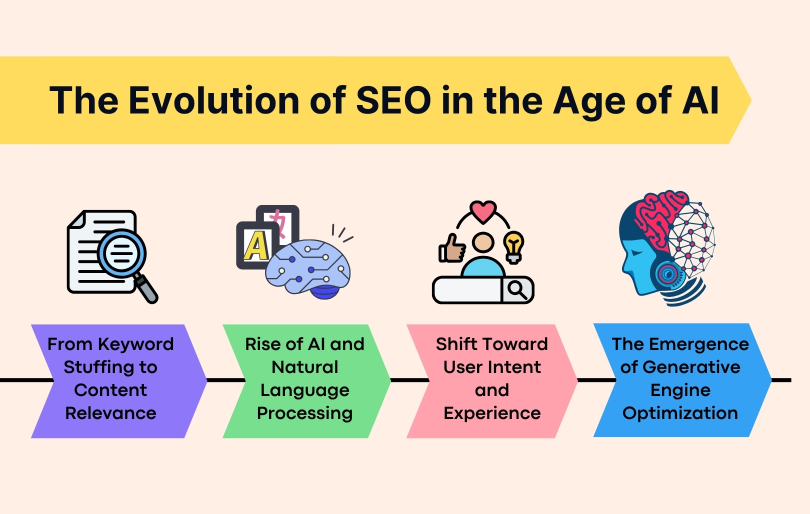
Search Engine Optimization (SEO) has evolved from keyword-focused tactics to a sophisticated, AI-driven discipline centered around user intent, content quality, and real-time insights. As artificial intelligence continues to shape search algorithms, digital marketers must adapt to smarter, more dynamic strategies for visibility and engagement. Learn How The Future of AI-Powered Search Changing the Game and shaping the evolution of modern search optimization.
From Keyword Stuffing to Content Relevance
In the early days, SEO revolved around stuffing web pages with keywords and backlinks to rank higher. Today, search engines prioritize valuable, user-centric content. Success now depends on delivering meaningful, well-structured information that aligns with search intent rather than manipulating algorithms.
Rise of AI and Natural Language Processing
AI and NLP have revolutionized how search engines interpret content. Google’s algorithms now understand context, semantics, and intent rather than exact-match keywords. This allows for more accurate search results and encourages brands to focus on conversational, natural, and informative content strategies.
Shift Toward User Intent and Experience
Modern SEO is driven by user intent. AI analyzes behavior patterns, search habits, and engagement metrics to prioritize pages that offer genuine solutions. Optimizing for user experience — through page speed, structure, and relevance — is now as critical as keyword placement.
The Emergence of Generative Engine Optimization (GEO)
Generative Engine Optimization represents the next era of SEO evolution. By integrating AI into content creation, GEO enables real-time adaptability, personalization, and predictive optimization. This innovative approach helps brands stay ahead of algorithm changes and deliver hyper-relevant experiences to users.
Key Differences Between Traditional SEO and GEO
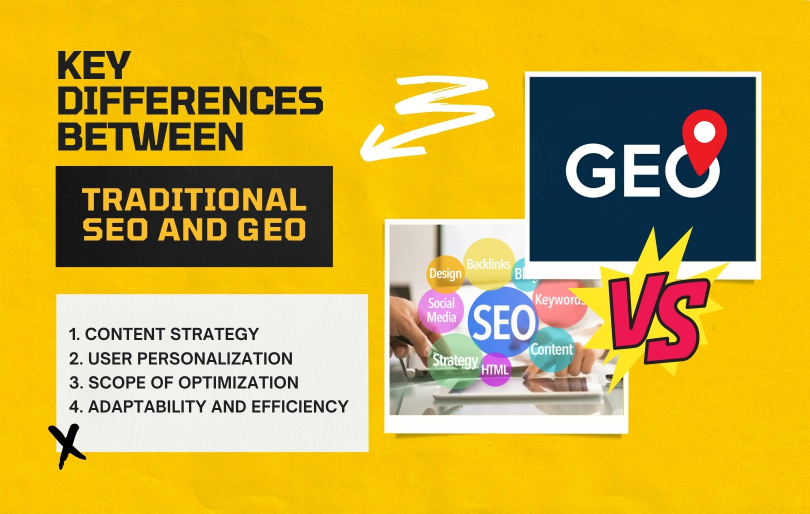
Traditional SEO and Generative Engine Optimization (GEO) differ significantly in approach, methodology, and outcomes. Compare modern SEO best practices for 2025 with emerging GEO techniques to future-proof your strategy. While SEO relies on static keywords and backlinks, GEO leverages AI to create dynamic, personalized content that adapts to real-time user behavior and trends.
1. Content Strategy
Traditional SEO relies on pre-selected keywords and static content updates, often requiring manual optimization. GEO, on the other hand, uses AI to generate content dynamically, ensuring that it remains relevant and aligned with user intent while responding to evolving search trends.
2. User Personalization
SEO typically targets broad audience segments based on generic demographics. GEO leverages behavioral data, past interactions, and preferences to deliver tailored content, providing a more personalized user experience and improving engagement and satisfaction across different touchpoints.
3. Scope of Optimization
While traditional SEO focuses primarily on improving search engine rankings, GEO takes a holistic approach. It optimizes for both search visibility and user engagement, predicting intent and delivering content that attracts visitors and encourages meaningful interactions.
4. Adaptability and Efficiency
SEO changes often require time-consuming manual updates and extensive research. GEO automates content creation and real-time optimization through AI, allowing marketers to respond instantly to trends, save resources, and maintain consistent relevance and quality across all digital channels.
How GEO Works: The Role of AI in Content Creation
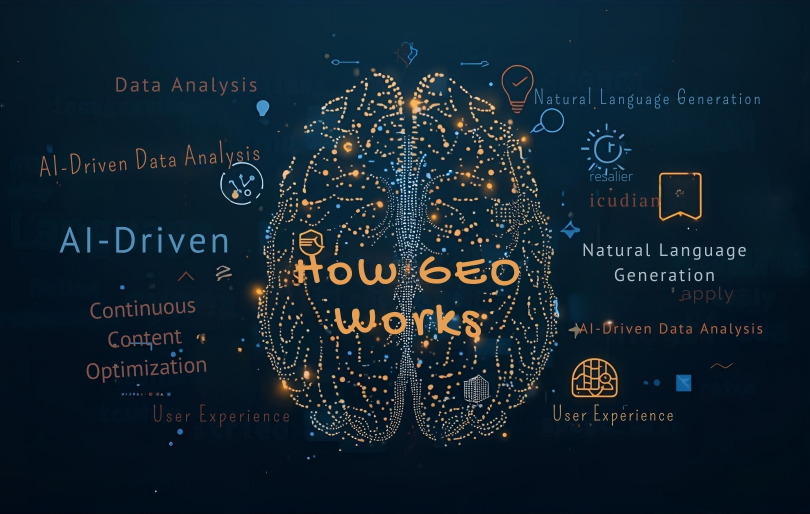
Generative Engine Optimization (GEO) harnesses AI to transform content creation. Discover the impact of AI tools for SEO that power GEO’s data-driven content creation process. By analyzing user behavior, search trends, and performance data, AI predicts and generates content that is highly relevant, personalized, and optimized, ensuring maximum engagement and SEO impact.
AI-Driven Data Analysis
AI collects and analyzes vast datasets, including user searches, engagement patterns, and content performance metrics. This data-driven approach allows GEO to identify what resonates with audiences, ensuring content is both highly relevant and aligned with user intent.
Natural Language Generation
Through natural language generation (NLG), AI creates human-like content efficiently. This automated process produces articles, blog posts, and other web content that are optimized for SEO while maintaining readability and a personalized tone for the target audience.
Continuous Content Optimization
AI continuously monitors content performance and updates it based on real-time data. By refining headlines, keywords, and structure, GEO ensures content remains current, engaging, and effective in meeting search engine requirements and user expectations.
Personalized User Experience
GEO leverages AI to deliver personalized content tailored to individual users. By adapting content to user preferences, behavior, and interests, businesses can increase engagement, improve satisfaction, and drive higher conversion rates across their digital platforms.
Benefits of Implementing Generative Engine Optimization
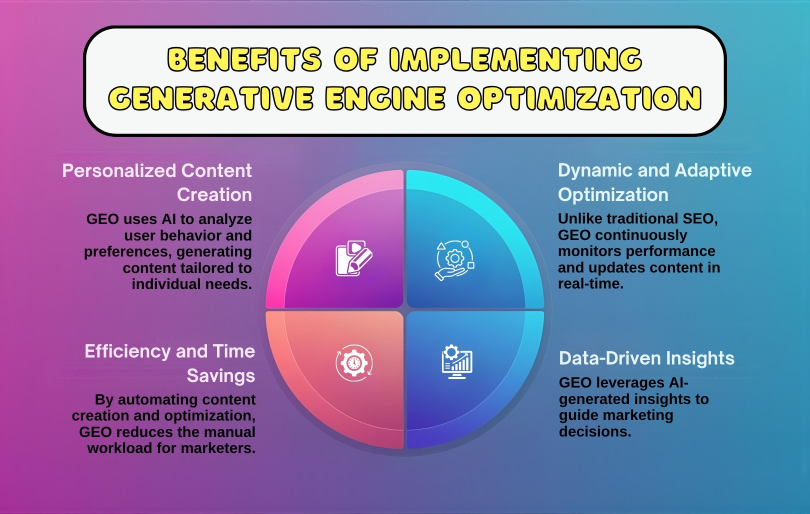
Generative Engine Optimization (GEO) transforms digital marketing by leveraging AI to create personalized, relevant, and dynamic content. By continuously adapting to user behavior and search trends, GEO enhances engagement, improves SEO performance, and drives measurable business results.
Personalized Content Creation
GEO uses AI to analyze user behavior and preferences, generating content tailored to individual needs. This level of personalization increases engagement, strengthens brand connection, and encourages higher conversion rates by delivering the right message to the right audience.
Dynamic and Adaptive Optimization
Unlike traditional SEO, GEO continuously monitors performance and updates content in real-time. This ensures relevance despite changing user behavior and evolving search engine algorithms, improving rankings and maintaining a consistently positive user experience.
Efficiency and Time Savings
By automating content creation and optimization, GEO reduces the manual workload for marketers. This efficiency allows teams to focus on strategic initiatives, while AI handles repetitive tasks, ensuring faster content production and higher overall productivity.
Data-Driven Insights
GEO leverages AI-generated insights to guide marketing decisions. By analyzing trends, engagement, and performance metrics, businesses can make evidence-based optimizations, leading to more effective campaigns, better ROI, and smarter resource allocation.
Why GEO Is the Future of Digital Marketing Strategy
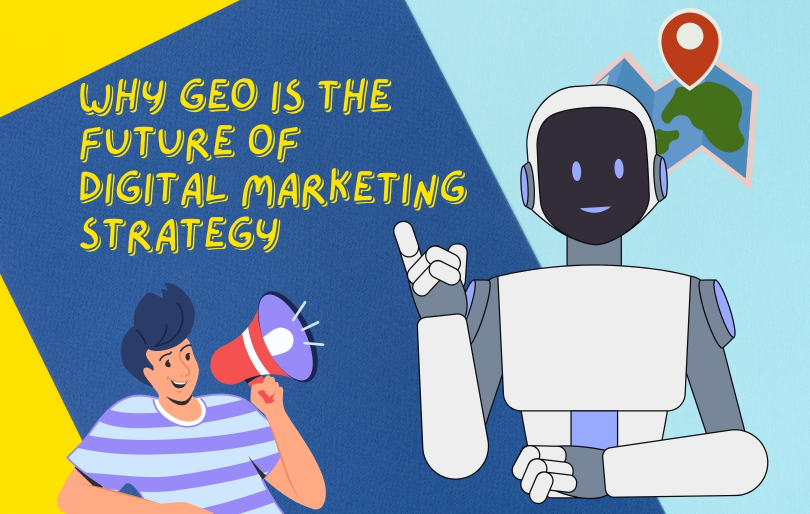
Generative Engine Optimization represents the future of digital marketing strategy, offering a more intelligent, dynamic, and personalized approach to content creation and optimization. As AI continues to advance, the ability to predict user intent and tailor content accordingly will become increasingly important. GEO leverages these advancements to create content that is not only optimized for search engines but also personalized for individual users, enhancing user engagement and satisfaction.
The dynamic and adaptive nature of GEO is another key reason why it is the future of digital marketing. In a rapidly changing digital landscape, the ability to continuously optimize and refine content is crucial for maintaining relevance and competitiveness. GEO’s real-time adaptability ensures that content remains aligned with the latest trends and user expectations, providing a more effective and responsive SEO strategy.
Moreover, the efficiency gains offered by GEO make it an attractive option for digital marketers. By automating the content creation and optimization process, GEO reduces the time and effort required to develop and maintain effective SEO strategies. This allows marketers to focus on other important aspects of their marketing campaigns, improving overall productivity and effectiveness. The combination of personalization, adaptability, and efficiency makes GEO a powerful tool for digital marketers looking to thrive in the AI era.
Potential Challenges and Limitations of GEO
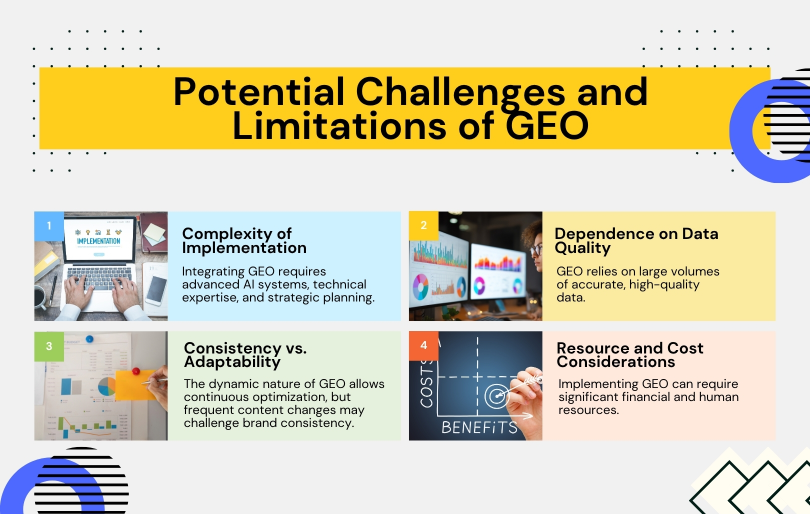
Generative Engine Optimization (GEO) offers transformative benefits for digital marketing, but it comes with challenges. From the complexity of implementation to data dependency, understanding these limitations is crucial for businesses aiming to leverage GEO effectively and avoid common pitfalls.
Complexity of Implementation
Integrating GEO requires advanced AI systems, technical expertise, and strategic planning. Businesses must invest in tools and skilled personnel, which can be a barrier for smaller companies, making proper planning essential for a successful adoption of GEO strategies.
Dependence on Data Quality
GEO relies on large volumes of accurate, high-quality data. Incomplete, biased, or inconsistent data can result in suboptimal content and reduced effectiveness. Ensuring data integrity is vital for achieving reliable AI-generated insights and content optimization.
Consistency vs. Adaptability
The dynamic nature of GEO allows continuous optimization, but frequent content changes may challenge brand consistency. Balancing adaptive updates with maintaining a coherent marketing message is crucial to prevent confusion and ensure effective campaign performance.
Resource and Cost Considerations
Implementing GEO can require significant financial and human resources. Smaller businesses may struggle with costs associated with AI tools, training, and maintenance, making careful budgeting and phased adoption critical for sustainable results.
Conclusion: Embracing the Shift to Generative Engine Optimization
As we move further into the AI era, the importance of embracing Generative Engine Optimization becomes increasingly apparent. GEO offers a more advanced, dynamic, and personalized approach to SEO, leveraging the power of AI to enhance digital marketing strategies. By understanding and implementing GEO, businesses can improve their search engine rankings, enhance user engagement, and achieve better overall results.
The shift to GEO requires a significant investment in technology and expertise, as well as a commitment to maintaining high-quality data. However, the potential benefits far outweigh the challenges, making it a worthwhile investment for businesses looking to stay competitive in the digital landscape. By adopting best practices and learning from successful case studies, businesses can effectively implement GEO and leverage its full potential. Elevate your visibility with our expert SEO and GEO Services designed to integrate GEO-powered strategies for long-term success.
In conclusion, Generative Engine Optimization represents the future of SEO in the AI era, offering a more intelligent, dynamic, and personalized approach to digital marketing. By embracing this shift, businesses can stay ahead of the curve and thrive in an increasingly competitive digital realm. The future of SEO is here, and it is powered by AI and the transformative potential of GEO.
